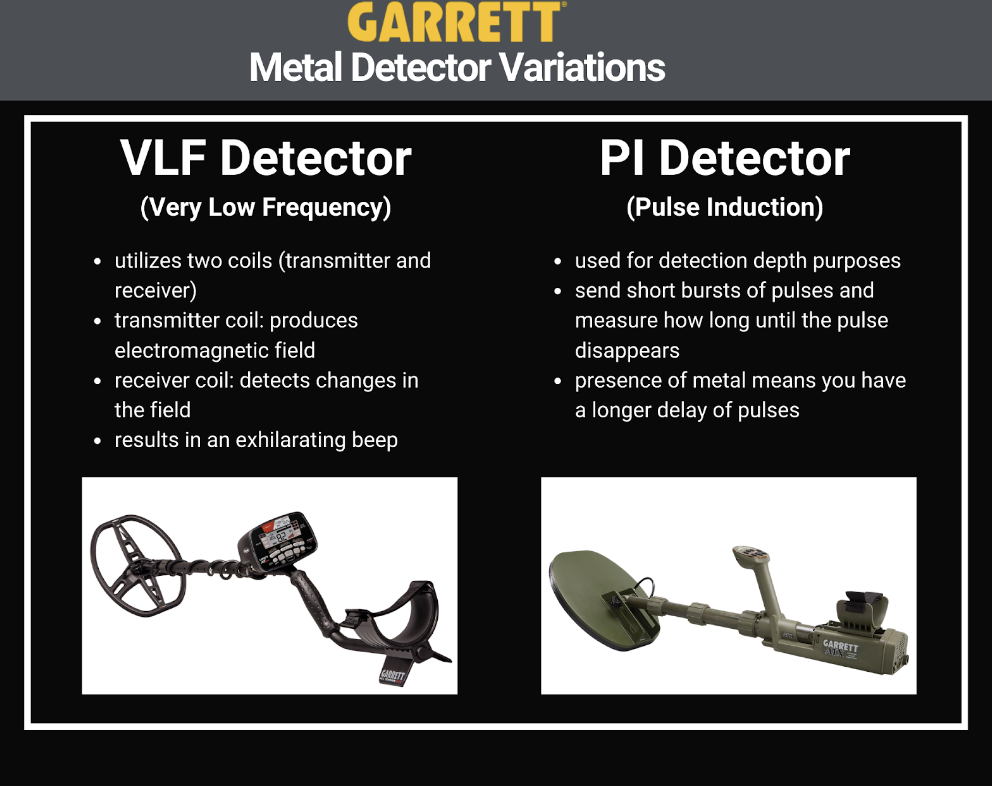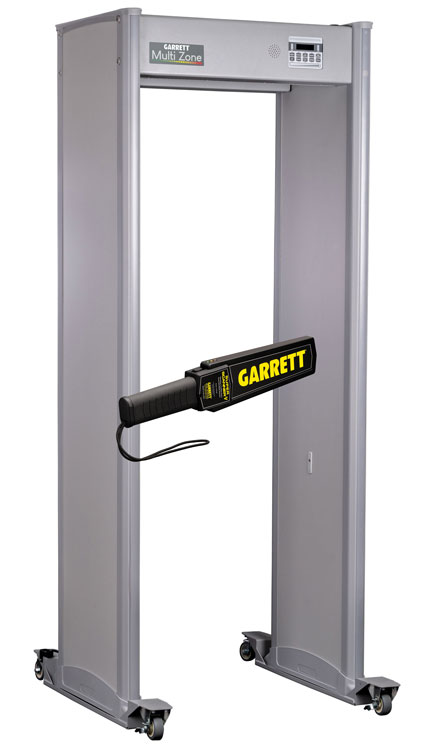Have you ever walked along a beach and witnessed someone waving a device close to the ground? Or perhaps you've passed through an airport security check and wondered how the walk-through structure can detect the smallest piece of metal in your pocket? These are the wonders of metal detectors. Despite their common involvement in our lives, many are unfamiliar with the range and intricacies of what these detectors can truly find.
From security applications for metal detectors to ensuring public safety, metal detectors have established an essential role in our modern world. While there are numerous brands and models available, very few can exceed the legacy and expertise that Garrett Metal Detectors brings to the table.
With a history spanning nearly 60 years, Garrett has been at the forefront of metal detection technology. Our company has continuously evolved to meet the changing demands of the metal-detecting world. Garrett Metal Detectors isn't just any company – it's a global leader. With products ranging from hand-held devices to sophisticated walk-through detectors for security purposes, our impact on the industry is undeniable. Being an International Standards Organization (ISO) 9001:2015 certified company further solidifies our commitment to excellence and reliability.
Types of Metals Detected
Metal detectors have the ability to detect a wide range of metals, each with its own unique properties and characteristics. By understanding the types of metals that metal detectors can detect, we can enhance our chances of finding hidden threats.
Does Aluminum Set Off Metal Detectors?
Firstly, ferrous metals contain iron and are strongly magnetic, making them easier to detect. Common examples of ferrous metals include iron, steel, and nickel. Non-ferrous metals, on the other hand, lack significant magnetic properties and are more challenging to detect. Some examples of non-ferrous metals are copper, aluminum, brass, and lead. Many question whether certain metals like aluminum, titanium, stainless steel, etc. are likely to set off a detector.
What Metals Cannot Be Detected by a Metal Detector?
Metal detectors are impressively accurate in identifying a wide variety of metallic objects. However, there's a common misconception that these devices can detect all metals with equal access. In reality, some metals prove to be challenging or nearly impossible for standard metal detectors to recognize.
Stainless Steel
Many metal detectors find stainless steel difficult to detect, especially when it's smaller in size. The reason? Stainless steel has low magnetic permeability, meaning it doesn't allow magnetic fields to pass through it as easily as other metals.
Non-Ferrous Metals
While many non-ferrous metals, such as gold, copper, and aluminum, can be detected, they might not be as easily discernible as ferrous metals, which contain iron. The detection capability largely depends on the metal detector's frequency, calibration, and the metal's size and shape.
By understanding the types of metals that metal detectors can and cannot detect, we can broaden our knowledge and appreciation for what is found with a Garrett detector. We are constantly innovating, designing detectors with higher sensitivities, and creating specialized functions to detect a broader range of metals with increased accuracy.
Security Applications of Metal Detectors
Metal detectors have a wide range of functions that are used in various aspects of our daily lives, especially in security settings.
Security and Law Enforcement
Metal detectors play a critical role in security applications. They are capable of detecting weapons and other potentially harmful metal objects, ensuring the safety of individuals in places like airports, public venues, and government buildings. By utilizing handheld metal detectors or walk-through detectors, security personnel can effectively screen for any metal objects in an exact location that might pose a threat.
Airport Security
Air travel remains one of the most popular modes of transportation, and ensuring the safety of passengers is paramount. Walk-through metal detectors at airports play a crucial role in identifying concealed metallic objects, from potentially harmful weapons to harmless personal items. Handheld metal detectors serve to refine the search, pinpointing the exact location of metallic objects, ensuring both thoroughness and efficiency.
Event Security
Concerts, sports games, political rallies, and public gatherings have seen an unfortunate rise in security threats over the years. Metal detectors at entry points serve as the first line of defense, helping to deter and detect potential threats. By identifying concealed metal objects, they enable security personnel to ensure the safety of attendees.
School Security
Schools and colleges, as places of learning, should remain sanctuaries of safety. Many institutions in the United States are incorporating metal detectors in their security protocols, aiming to protect students, faculty, and staff from potential threats.
In the realm of security, the importance of timely and accurate threat detection cannot be overstated. Metal detectors stand as essential tools in maintaining public safety. Companies like Garrett who are leading this industry of security are ensuring that public spaces remain havens of safety and peace.
Basic Principles of Metal Detectors
At the heart of every metal detector is the principle of electromagnetism. Essentially, these devices generate an electromagnetic field, typically through a circular accessory known as a search coil. When this electromagnetic field comes into contact with a metal object, it induces electric currents within that object, known as eddy currents.
These eddy currents generate their own electromagnetic fields. The detector senses these secondary fields and reacts by producing a signal—often a beep or a buzz—which alerts the user to the presence of a metal object.
Variations in metal detecting technology have given rise to different types of metal detectors.

VLF Detector
The Very Low Frequency (VLF) detectors are the most common. VLF metal detectors operate on two distinct coils: the transmitter coil, which produces the electromagnetic field, and the receiver coil, which detects any changes in this field due to the presence of metal. When a metallic object interferes with the electromagnetic field, it affects the frequency range. This change is detected by the receiver coil, leading to that exhilarating beep! In relation to security and crime investigation, VLF detectors play a critical role. They allow the investigator to prioritize items that might be more pertinent to the case. For example, a discarded non-ferrous metal belt buckle or a piece of jewelry could be significant evidence linking a suspect or victim to the crime investigation.
PI Detector
Another type, the Pulse Induction (PI) detector, is primarily used for its detection depth capabilities. Instead of continuous waves, PI detectors send short bursts of pulses. They then measure the duration it takes for the pulse to fade away. The presence of metal will cause a delay in this decay, signaling a find. With crime investigation and security, PI detects objects that are far below the ground surface. For example, a buried metal box is found that proves to be vital evidence and a metallic object with trace amounts of blood and a potential weapon can be linked to the crime. Additionally, PI detectors are seen in most walk through detectors. If you are a frequent traveler at the airport, you have seen the process of examination at security checkpoints.
The synergy of the VLF and PI detectors is extremely beneficial. The VLF's ability to discriminate between metal types ensures the team doesn't waste time on irrelevant finds, while the PI's depth detection capabilities ensure no evidence remains overlooked. In the realm of crime scene investigation, the timely recovery of evidence, often paramount to solving a case, showcases how metal detecting technologies like VLF and PI detectors play a key role.
The effectiveness of metal detectors isn't just about the underlying technology. It's also about understanding the nuances of detection. This is where choosing a reputable brand like Garrett makes a difference—we engineer our products with both the novice and the expert in mind, ensuring a successful metal-detecting experience.
History of Metal Detectors
The concept of metal detection can be traced back to the late 19th century. In an attempt to save the life of President Garfield after an assassination attempt, Alexander Graham Bell devised an early metal detector. While the device failed to locate the bullet lodged in the President, it was a pivotal moment that set the foundation for the future of metal detection.
Fast-forward to the 20th century, when technological advances led to the creation of more sophisticated devices with greater detection and accuracy. Because security operations and airport security have become crucial tools in the modern world, metal detectors have become indispensable.
Garrett is at the forefront of this evolution. With products like the Garrett Ace, the company carved out a name for itself not just as a manufacturer but as an innovator. With a deep understanding of the demands of both amateur and professional metal detectorists, we have been instrumental in pushing the boundaries of what metal detectors can achieve. Our commitment to excellence can be seen in our products, including strict security measures in the United States.
Choose Garrett Metal Detectors's Expertise and Products
When it comes to metal detection, one name stands out as a global leader - Garrett Metal Detectors. With nearly 60 years of experience, we have consistently delivered cutting-edge metal detection products for various industries and applications worldwide. Our reputation for excellence and innovation has made us a trusted name among both professionals and hobbyists. As an ISO 9001:2015 certified company, we uphold the highest standards of quality and performance in our products.
We offer a diverse range of metal detectors designed to meet specific needs and applications. Whether you're searching for security and law enforcement solutions or pursuing recreational metal detecting, Garrett has you covered.
Walk-Through Metal Detectors
Our walk-through metal detectors provide reliable and precise threat detection in high-security environments. Built with cutting-edge technology, they offer advanced features such as multiple detection zones and customizable settings, ensuring accurate identification of metal objects without inconveniencing innocent individuals.

Hand-Held Metal Detectors
Ideal for security personnel, Garrett's hand-held metal detectors offer mobility and flexibility during routine searches or targeted scans. These portable devices deliver excellent sensitivity and pinpointing capabilities, facilitating efficient and thorough search operations.

Contact Us Today and See What Your New Metal Detector Can Detect
Garrett Metal Detectors is committed to providing outstanding customer support and satisfaction. Our knowledgeable team is always ready to assist customers with any inquiries, ensuring a seamless experience throughout the metal detecting journey. Our extensive network of authorized dealers ensures that customers receive access to their products and services worldwide. If you're embarking on your own metal detecting journey, ensure you're equipped with the best and contact Garrett today! With our unparalleled expertise, you're not just getting a product; you're gaining a partner in discovery.








